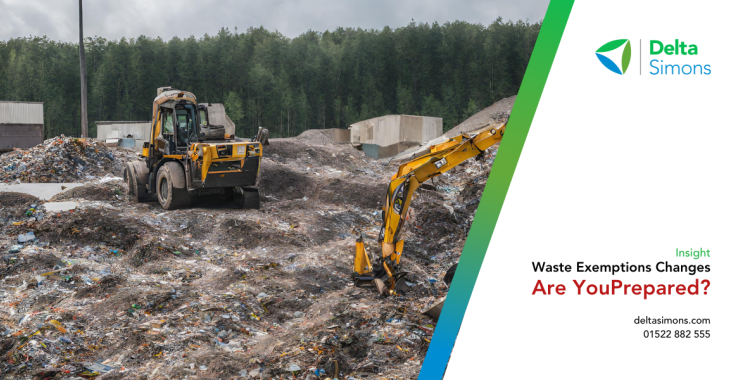ESOS Phase 3: 1 Year To Go
02 Jul 2023
Carbon management
Energy
Sustainability
Environmental Social Governance (ESG)
The Department for Business, Energy & Industrial Strategy (BEIS) estimates that nearly 12,000 UK businesses are in the scope of the Energy Savings Opportunity Schemes (ESOS) in its third compliance cycle phase. Businesses that qualify for ESOS are required to carry out audits of their energy use every four years in order to identify potential energy-saving measures.
In June, the Government made an announcement stating that the implementation date for Phase 3 Compliance with ESOS would be postponed until the 5th of June 2024 (previously scheduled for the 5th of December 2023). This decision was taken to provide ample time for participants to fulfil the new requirements and for you, as the assessor, to conduct the necessary assessments.
With less than 1 year to go until the Phase 3 deadline, Sustainability Unit Director Rob Molyneux delivers key insight into ESOS.
In the current energy climate ESOS (Energy Savings Opportunity Schemes) should be at the top of your agenda, not least because if you qualify for ESOS and fail to comply with the requirements, you can be met with multiple fines, the cost savings that can be achieved through ESOS are an important component to business resilience during the energy and economic crisis.
Conducting a thorough ESOS assessment not only allows an organisation to reduce their energy spend and lower their carbon emissions. The ESOS assessment also encourages workforce engagement and helps companies to avoid financial penalties.
What Is The Energy Savings Opportunity Scheme (ESOS)
ESOS stands for the Energy Savings Opportunity Scheme, which is a UK government program that requires certain large organisations to conduct energy audits on their buildings and industrial processes. The audits are designed to identify opportunities for energy savings and to help organisations become more energy efficient. The program is administered by the UK Department of Energy and Climate Change.
The ESOS program is important for several reasons. First and foremost, it is designed to help large organisations reduce their energy consumption and become more energy efficient. This can have significant environmental benefits, as reducing energy use can help to reduce greenhouse gas emissions and other forms of pollution. Additionally, becoming more energy efficient can also save organisations money on their energy bills.
The Energy Savings Opportunity Scheme Regulations 2014 (Regulations), introduced on 17 July 2014 by the UK government’s Department of Energy and Climate Change (DECC), requires compliance by organisations that employ 250 or more employees, or have an annual revenue £44 million and an annual balance sheet total in excess of £38 million. ESOS runs in four phases with each phase consisting of four years. We are currently in Phase 3, which started in December 2019. Each phase runs with 2 key dates, the qualification and the compliance date;
- Qualification Date - the date on which ‘large’ organisations must comply with the scheme
- Compliance Date - IF your organisation qualifies, the Compliance Date is the date by which you must notify the Environment Agency that you have complied with the ESOS regulations.
ESOS Phase 1 -
- Qualification Date 31st December 2014
- Compliance Date 5th December 2015
ESOS Phase 2 -
- Qualification Date 31st December 2018
- Compliance Date 5th December 2019
ESOS Phase 3 -
- Qualification Date 31st December 2022
- Compliance Date 5th June 2024 (Extended Deadline)
ESOS Phase 4 -
- Qualification Date 31st December 2026
- Compliance Date 5th December 2027
Energy Savings Opportunity Scheme (ESOS) Phase 3
The deadline for ESOS Phase 3 is June 5th 2024, however, it is strongly advised that preparations are made as early as possible to avoid potential penalties for late submission or non-compliance.
As the deadline for submission approaches the demand for audits is fast increasing, resulting in the number of available ESOS Lead Assessors and Auditors will decrease, presenting a challenge for companies to meet the closing date for reports.
Key changes to Phase 3
In July 2022, the government announced key changes to ESOS phase 3 in their publication; ‘Strengthening the Energy Savings Opportunity Scheme (ESOS): Government Response’, in a bid to engage more companies into the scheme including Medium-Sized Enterprises (MSEs), deliver clearer guidance for requirements and enforce and elevate higher standards for energy data reporting. These changes include:
- The Phase 3 requirement allows for a 5% De Minimis and requires an audit of 95% of total energy consumption. Previously companies had been required to report 90% of their energy consumption with an allowance made for De Minimis consumption.
- Clearer guidance on the requirements around site sampling, including clearer guidance on recommended minimum sampling levels for both number of sites sampled and percentage of total energy consumption sampled.
- Extensions of data required for compliance monitoring and enforcement including the addition of an energy intensity metric – kWh/m2 for buildings, kWh/unit for industry and kWh/miles for transport.
- ESOS reports must be shared with subsidiaries
- ESOS reports will need to outline the next steps for implementing recommendations via an action plan following the phase 3 compliance deadline. Targets and action plans will then be reported on during Phase 4.
- Phase 1 and 2 saw a significant number of non-compliant companies at the point of the Compliance Date, with extensions required to the deadline. In response, there will be an increased penalty for non-compliance – an initial penalty of up to £50k and an additional £500 per day until the company complies.
- From Phase 4 onwards the ESOS balance sheet and turnover thresholds will align with Streamlined Energy and Carbon Reporting (SECR) to include companies with 250 employees, or a balance sheet of £18 million or a turnover of £36 million - bringing in many medium sized companies into the ESOS qualification threshold.
Delta-Simons have delivered ESOS energy audits for clients across a range of sectors, including offices, retail, hospitality, construction, offshore drilling and manufacturing, identifying thousands of pounds in energy savings.
Delta-Simons have extensive experience in undertaking energy assessments on behalf of companies and can guide you through the 10-step ESOS process.
- Review existing audit work
- Agree on audit methodology, scope, timescales
- Establish a cost-effective sample of building audits
- Prioritise low and zero-cost energy efficiency measures
- Identify capital investment energy efficiency measures
- Determine appropriate energy-use profiles
- Compile ESOS evidence pack
- Lead Assessor sign-off
- Board director sign-off
- Notify the Environment Agency of compliance
Our dedicated consultants are well-placed to conduct a gap analysis which reviews both current and historic consumption data and provides an assessment of your collection processes. The work will involve the delivery of BS EN 16247-2 compliant building energy audits and the submission of an ESOS Compliance Report.
ESOS Lead Assessors
The Energy Savings Opportunity Scheme (ESOS) requires all large companies in the UK to carry out energy auditing of their Buildings, Industrial Processes and Transport operations, and requires oversight, review and approval by an ESOS Lead Assessor, who has been approved by one of the nominated approved register. Our ESOS services are delivered by our in-house qualified, certified Lead ESOS Assessors.
Our ESOS Lead Assessors have a proven track record in delivering ESOS Compliance and Energy Audits across a wide range of industrial sectors including:
- Transport, Distribution and Logistics
- Manufacturing
- Agriculture
- Commercial Offices
- Retail
- Technology & Software
- Hospitality & Leisure
- Construction
- Offshore drilling
- Food and Drink
ESOS is the UK Government’s approach to the EU Energy Efficiency Directive (EED) (2012/27/EU) Article 8 (4-6). For clients subject to EED, with support from our Inogen associates throughout the EU, Delta-Simons are perfectly positioned to coordinate your compliance across all EU Member States for those businesses that operate across the continent.
What Is The Energy Efficiency Directive (EED)
The 2012 Energy Efficiency Directive (EED), amended in 2018, and the 2014 Energy Savings Opportunity Scheme (ESOS) are similar in that they both aim to improve energy efficiency and reduce energy consumption. However, there are some key differences between the two.
The EED is a European Union directive that applies to all member states. The EED establishes a framework for setting national energy efficiency targets, whereas ESOS focuses specifically on requiring organisations to conduct energy audits and identify opportunities for energy savings. The EED aims to help member states improve their energy efficiency and reduce their energy consumption. The EED establishes a framework for member states to set national energy efficiency targets, and it also requires large enterprises to conduct energy audits and to implement measures to improve their energy efficiency. Reflecting on their ambition to be the first carbon-neutral continent by 2050, the European Commission revised the EED, putting forward further proposals in 2021, promoting ‘energy efficiency first’ as a core principle for EU energy policy making.
ESOS, on the other hand, requires certain large, and medium-sized, organisations in the UK to conduct energy audits on their buildings and industrial processes. The audits are designed to identify opportunities for energy savings and to help organisations become more energy efficient.
Whether you are subject to ESOS or EED, both are designed to promote energy efficiency and reduce energy consumption. They deliver an opportunity to businesses in Europe and the UK to reduce their carbon emissions, energy consumption and ultimately save money.
“Maximising the savings from ESOS is particularly important given the changes to the policy landscape since ESOS was introduced, including legislation to require net zero by 2050. Energy efficiency has a key role to play for the UK in meeting this target and ambitious interim carbon budgets, as unlike some other technologies that will be needed to drive decarbonisation in the future, energy efficiency measures are already well established and proven methods that are cost-effective for businesses to deploy.” - ‘Strengthening the Energy Savings Opportunity Scheme (ESOS): Government Response.
These initiatives should be embraced in the midst of the energy crisis and impending economic recession.
Our team can support you in complying with ESOS and EED regulations through the delivery of compliance plan workshops, which will establish full client responsibilities. In instances where multiple options exist, we will work closely with organisations to agree a preferred approach and methodology, delivering energy audits, completion of ISO 50001 Certification and conducting Green Deal Assessments.
Webinar
To help you navigate through the ESOS Assessment process, we are hosting a free-to-access webinar on 27th September 2023.
Sign up now and understand the changes and get ahead: REGISTER
For more information about ESOS and how we can help you comply with the Phase 3 deadline, connect with Rob and Lucion Group's Head of Business Development, Kimberley Johnson, to discuss your needs.
About The Author
Rob Molyneux
Sustainability Unit Director
With 18 years’ operational experience in the energy and sustainability field, primarily in energy and carbon for the built environment and corporate sustainability.
With clear challenges in front of business in relation to climate change, carbon emissions and sustainability, it is an exciting time to be in this sector with the ability to help organisations to understand and mitigate the risks – and to grasp the opportunities – we face as a result of climate change impacts on our businesses.
Rob Molyneux
E: rob.molyneux@deltasimons.com
M: +44 (0)7974 188 349
Linkedin: Rob Molyneux






